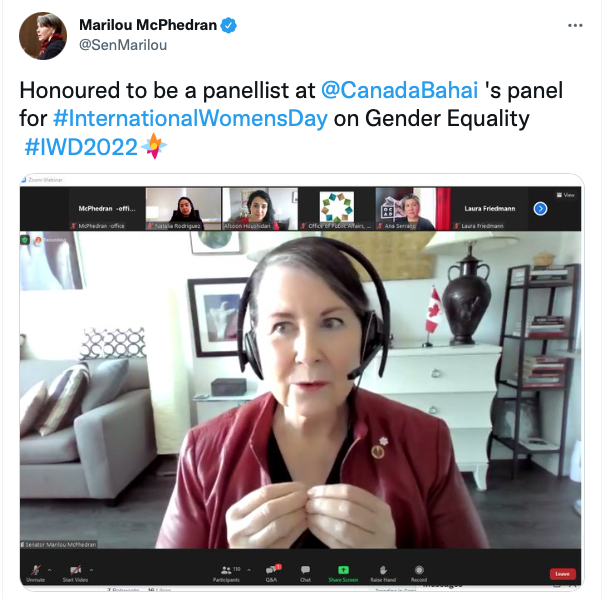How could we imagine a future in which the equality of women and men has been fully realized in society? What kind of transformation would be required in order to realize this vision?

These are the questions that were at the heart of a panel discussion organized by the Office of Public Affairs to mark International Women’s Day on March 8, 2022.
“While the principle of the equality of women and men is widely accepted in society today, we still see how the effects of centuries of inequality hold our society back,” said Geoff Cameron, Director of the Office of Public Affairs. “This event was an opportunity to explore more deeply how this fundamental principle, which is central to the Baha’i teachings, can be translated into reality.”
Held as a Zoom webinar, the event brought together more than 100 people across the country to hear three distinguished panelists reflect on the future of gender equality in relation to different sectors of society.
Afsoon Houshidari moderated the discussion, and she opened by calling attention to Baha’i scriptures, which emphasize the importance of gender equality: “Until womankind reaches the same degree as man, until she enjoys the same arena of activity, extraordinary attainment for humanity will not be realized; humanity cannot wing its way to heights of real attainment.”
Senator Marilou McPhedran, a human rights lawyer and founder of several women’s rights organizations, pointed to political reforms that are needed to achieve gender equality. She observed that while great strides have been made in the direction of gender parity in the Canadian Senate, the culture of politics continues to be influenced by “patriarchy,” where men dominate positions of leadership.
Her remarks were followed by Ana Serrano, President and Vice-Chancellor of the Ontario College of Art and Design. She cited her inspiration in a quotation by the late Dr. Paul Farmer, who said: "The idea that some lives matter less is the root of all that is wrong in the world." She connected this to the feminist movement, which has sought to “carve a path towards dismantling these same systems [of oppression].”
Serrano proceeded to challenge the audience to think about how gender inequality manifests itself in the design and use of technology. She observed that technology is “not neutral,” and that it simply extends our ability to organize society – often amplifying social problems that we have left unresolved. We need to consider gender equality when designing technology and seeking to regulate its usage, she observed.
Natalia Rodriguez, a member of the Baha’i community and a partner at Conway Baxter LLP, spoke to her experience in the legal profession. She observed that despite the surge in women lawyers entering the profession – almost 60% of Ontario’s youngest lawyers are women – there are significant pay disparities between men and women, and significant gaps in representation at the leadership level. The reasons for this include both cultural and structural factors that discourage the advancement of women within the profession.
Rodriguez added that the perpetuation of inequality does not only disadvantage women, it also robs the profession – and society at large – from the benefits that accrue from the full participation of women.
Furthermore, what is most needed over the long run is education. Rodriguez emphasized that all need to be taught spiritual qualities, such as empathy, if we want to see the eradication of injustice and inequality.
“When we teach empathy, it's a natural feeling to want to ensure that all of us are elevated in society in the manner that we should be,” she reflected. “People intervene when they see things that are not right, when they see behaviours that are going against those principles of equality and justice.”
At the close of the event, Houshidari thanked attendees for joining the discussion, and remarked: “we are really part of a movement, each of us like a drop in a sea, and we're hoping that this sea will swell and that the tide of equality of men and women will triumph over the shores of the world.”

